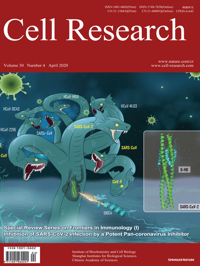
Volume 30, No 4, Apr 2020
ISSN: 1001-0602
EISSN: 1748-7838 2018
impact factor 17.848*
(Clarivate Analytics, 2019)
Volume 30 Issue 4, April 2020: 300-314 | Open Access
REVIEW ARTICLE
Targeting immunometabolism as an anti-inflammatory strategy
Eva M. Pålsson-McDermott1 and Luke A. J. O’Neill1
1 School of Biochemistry and Immunology, Trinity Biomedical Science Institute, Trinity College Dublin, Dublin, Ireland
Correspondence: Eva M. Pålsson-McDermott (palssone@tcd.ie)
The growing field of immunometabolism has taught us how metabolic cellular reactions and processes not only provide a means to generate ATP and biosynthetic precursors, but are also a way of controlling immunity and inflammation. Metabolic reprogramming of immune cells is essential for both inflammatory as well as anti-inflammatory responses. Four anti-inflammatory therapies, DMF, Metformin, Methotrexate and Rapamycin all work by affecting metabolism and/or regulating or mimicking endogenous metabolites with anti-inflammatory effects. Evidence is emerging for the targeting of specific metabolic events as a strategy to limit inflammation in different contexts. Here we discuss these recent developments and speculate on the prospect of targeting immunometabolism in the effort to develop novel anti-inflammatory therapeutics. As accumulating evidence for roles of an intricate and elaborate network of metabolic processes, including lipid, amino acid and nucleotide metabolism provides key focal points for developing new therapies, we here turn our attention to glycolysis and the TCA cycle to provide examples of how metabolic intermediates and enzymes can provide potential novel therapeutic targets.
Cell Research advance online publication 30 May 2006; doi: 10.1038/sj.cr.7310066
FULL TEXT | PDF
Browse 1039


